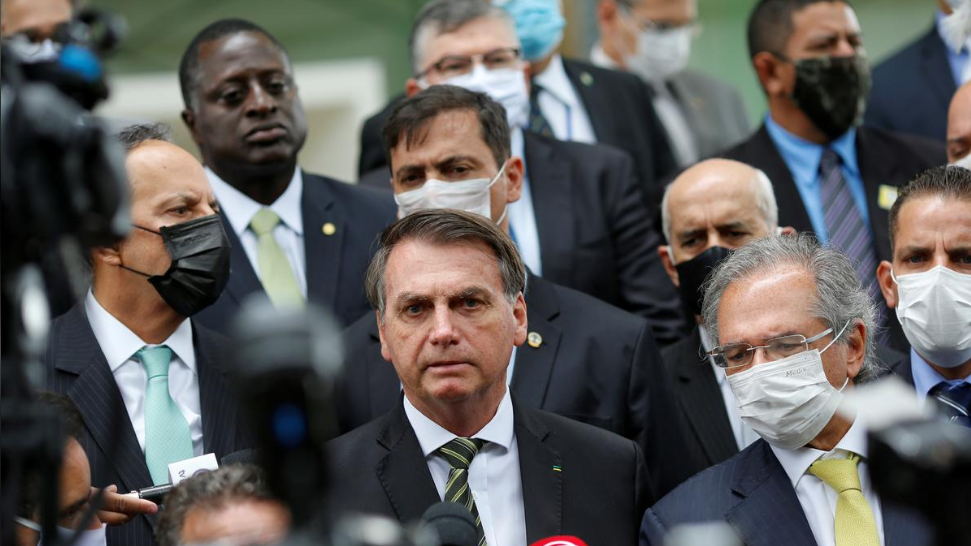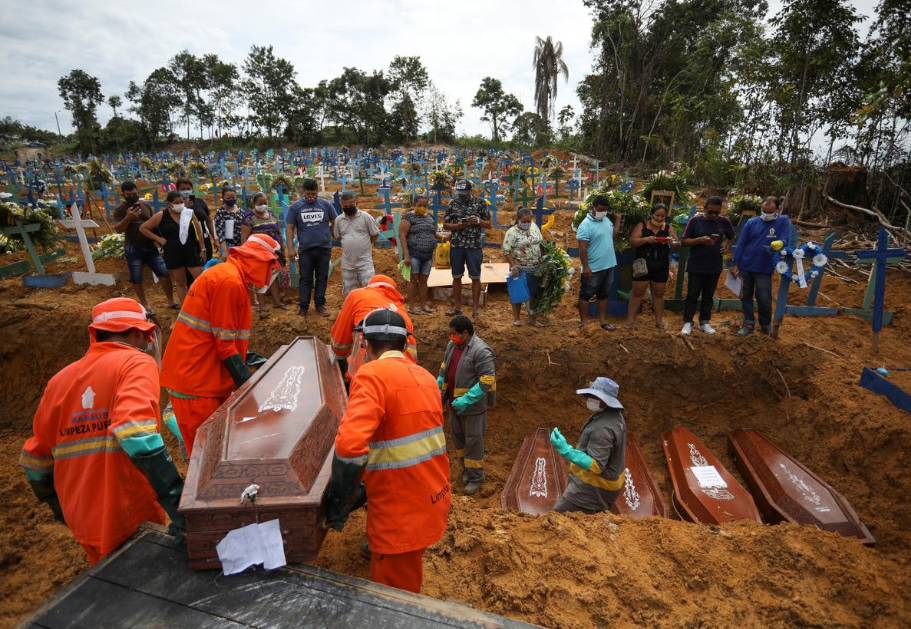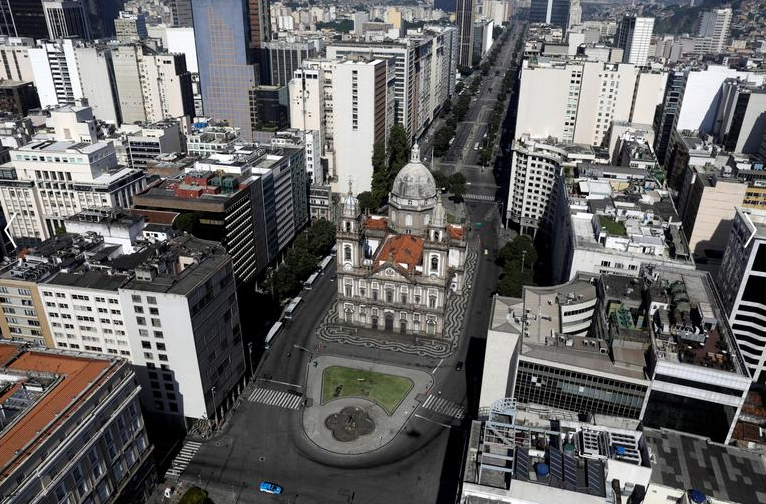Editor's note: This is the 57th article in the COVID-19 Global Roundup series. Here is the previous one.
Brazil, which reported a record number of COVID-19 deaths on Friday, is fast emerging as one of the world's coronavirus hot spots. Its health ministry has so far registered 145,328 confirmed cases and 9,897 deaths, making Brazil the most deadly outbreak in an emerging market nation.
President under fire
From the unrelenting waves of pot-banging protests to the growing list of former presidents, politicians and newspaper editorial boards speaking out against the president, it portrays a vivid picture of how unpopular Jair Bolsonaro has become domestically. But disapproval of Bolsonaro's blunt defiance isn't only confined within Brazil's borders. On Friday, the world's most prominent medical journal The Lancet issued an editorial describing the Brazilian president as "the biggest threat to Brazil's ability to successfully combat the spread of the coronavirus and tackle the unfolding public health crisis."
Bolsonaro is one of the few global leaders who has openly railed against lockdown measures to combat the coronavirus. He has asserted that the economic risks of shutting down Brazil's economy outweigh the dangers posed by a disease he calls a "little cold."

Brazilian President Jair Bolsonaro (C) speaks with journalists after a meeting with President of Brazil's Supreme Federal Court Dias Toffoli, amid the COVID-19 outbreak, at the Supreme Federal Court in Brasilia, Brazil, May 7, 2020. /Reuters
Brazilian President Jair Bolsonaro (C) speaks with journalists after a meeting with President of Brazil's Supreme Federal Court Dias Toffoli, amid the COVID-19 outbreak, at the Supreme Federal Court in Brasilia, Brazil, May 7, 2020. /Reuters
In response to a journalist's question last week about the record number of deaths from coronavirus, Bolsonaro said "So what? I'm sorry, but what do you want me to do?"
The Lancet editorial, which pointed out the nationwide confusion sowed by his disregard for and flouting of lockdown measures, said "he needs to drastically change course or must be the next to go."
The fact that an apolitical science journal chose to explicitly condemn the head of a nation sounds extraordinary alarms to the damages that Bolsonaro's behaviors could inflict on the country's population.
But despite the apparent dangers of advocating the removal of lockdown measures, the Trump-like populist leader still has a large support base. People yearning for economic reopening have lined up behind the president and staged a string of demonstrations over the last few weeks.
Sparked by existing restrictive measures largely imposed by governors and frustrated over the president's lack of authority to overturn them, the demonstrators have also been calling for a military intervention to eliminate the executive obstacles. The country's supreme court, legislature, and governors were all subject to attacks in these protests.
While the Bolsonaro-led calls for economic reopening have not abated, the epidemic is relentlessly ravaging across the country.
The coronavirus ravage
A report by Imperial College London published on Friday showed that "the epidemic is not yet controlled and will continue to grow" in Brazil, in stark contrast to parts of Europe and Asia, where enforced lockdowns have had success.
"While the Brazilian epidemic is still relatively nascent on a national scale, our results suggest that further action is needed to limit spread and prevent health system overload," the Imperial College report said.
In its editorial, The Lancet also noted the challenges Brazil faces. About 13 million Brazilians live in shanty town "favelas," where hygiene recommendations and physical distancing are near impossible to follow. "These loggers and miners now risk bringing COVID-19 to remote populations," it said.
The country's indigenous population was also under "severe threat" even before the COVID-19 outbreak due to the government turning a blind eye to or even encouraging illegal mining and logging in the Amazon rainforest.
The largest of nine states in Brazil's Amazon rainforest, Amazonas has registered nearly 19.4 coronavirus deaths per 100,000 residents, compared to 4.4 for all of Brazil, according to a Reuters calculation based on the death toll released by the federal Health Ministry on Thursday. Yet death registry data from public notaries indicates the ministry's statistics may far underestimate the actual toll. Officials have previously acknowledged in media briefings that the toll is likely higher as cases go undetected because of a lack of testing, without saying by how much.
The death toll from COVID-19 in the country's worst-hit part of the remote region may be three times the official count, according to data from public notaries reviewed by Reuters, as the spread of the disease overwhelms the public health system.
Officials in Manaus, state capital of Amazonas, said they were out of hospital beds and struggling to keep pace with the burials needed. Manaus was the first in Brazil to run out of intensive care units.
In certain instances, Manaus has resorted to burying five at a time in shared graves, according to a Reuters photographer who has seen more than 50 burials in local cemeteries. Mayor Virgilio Neto said some 120 people are being buried a day and the city may run out of coffins soon.

Gravediggers carry a coffin during a collective burial of people who died of COVID-19, at the Parque Taruma cemetery in Manaus, Brazil, April 28, 2020. /Reuters
Gravediggers carry a coffin during a collective burial of people who died of COVID-19, at the Parque Taruma cemetery in Manaus, Brazil, April 28, 2020. /Reuters
Meanwhile, hospitals are being overwhelmed and ICU beds are also falling short of supply in other populous states. In Rio de Janeiro and Pernambuco, more than 90 percent of available ICU beds have been occupied as of this week.
Maranhao Governor Flavio Dino of the Brazilian Communist Party also said that 95 percent of intensive care beds in state-run public hospitals in the area under lockdown are occupied. "We're doing a preventative lockdown," Dino said. "We aren't dealing with chaos, but what we were observing is that demand was growing quickly and was above our expansion capacity for beds and health professionals."
Cities entering official lockdown
While Bolsonaro has compared the virus to "a little flu," the reaction of Brazil's 27 state and district governments has varied widely, with most taking the epidemic much more seriously than the president.
Most states have imposed business restrictions of some sort, in which non-essential services and commerce are forbidden, while stopping short of mandating an official lockdown, which would limit people's movement. In some areas, enforcement has been spotty, and shops have remained open despite official decrees.
This week, it saw three major cities announcing the country's first official lockdown measures to try to slow the spread of the disease.
Sao Luis became Brazil's first major city to begin a coronavirus "lockdown" on Tuesday with another, Fortaleza, saying it would follow suit on Friday, as local health services struggle to cope with the pandemic.
Tuesday's lockdown measure covers Sao Luis and parts of three other municipalities with a total population of around 1.3 million people in the poor northeastern state of Maranhao. It forbids people from going outside except to obtain groceries, medications or cleaning supplies.
Maranhao has not felt the brunt of the crisis, in contrast to the populous southeastern states of Sao Paulo and Rio de Janeiro and the interior state of Amazonas, where hospitals are overwhelmed and authorities have resorted to burying victims in mass graves.

The Candelaria church and Presidente Vargas Avenue in downtown Rio de Janeiro, Brazil, March 26, 2020. /Reuters
The Candelaria church and Presidente Vargas Avenue in downtown Rio de Janeiro, Brazil, March 26, 2020. /Reuters
Fortaleza in Ceara state, among the hardest-hit of all Brazilian cities, is slated to enter a 20-day lockdown period starting from Friday.
The two cities' attempts to implement stricter confinement measures run counter to loosening elsewhere in the country even as the virus' spread shows little sign of slowing.
The lockdown, which lasts until May 14, was mandated by a court, but has the support of the governor. It comes as support for social and business restrictions has slipped in Brazil as a whole, with President Jair Bolsonaro downplaying the danger of the virus and focusing on its economic impact.
On Friday, the government of Sao Paulo, Brazil's most populous state, also extended mandatory quarantine orders to May 31. They had been schedule to expire on May 11.
While Brazilians initially supported nationwide social isolation measures by wide margins, polls have showed support slowly slipping, with one late April poll showing a statistical tie between those who favor a generalized quarantine and those who favor allowing low-risk individuals to return to work.
(Cover image: Brazilian President Jair Bolsonaro speaks with journalists after a meeting with President of Brazil's Supreme Federal Court Dias Toffoli, amid the COVID-19 outbreak, at the Supreme Federal Court in Brasilia, Brazil, May 7, 2020. /Reuters)
(With input from Reuters)